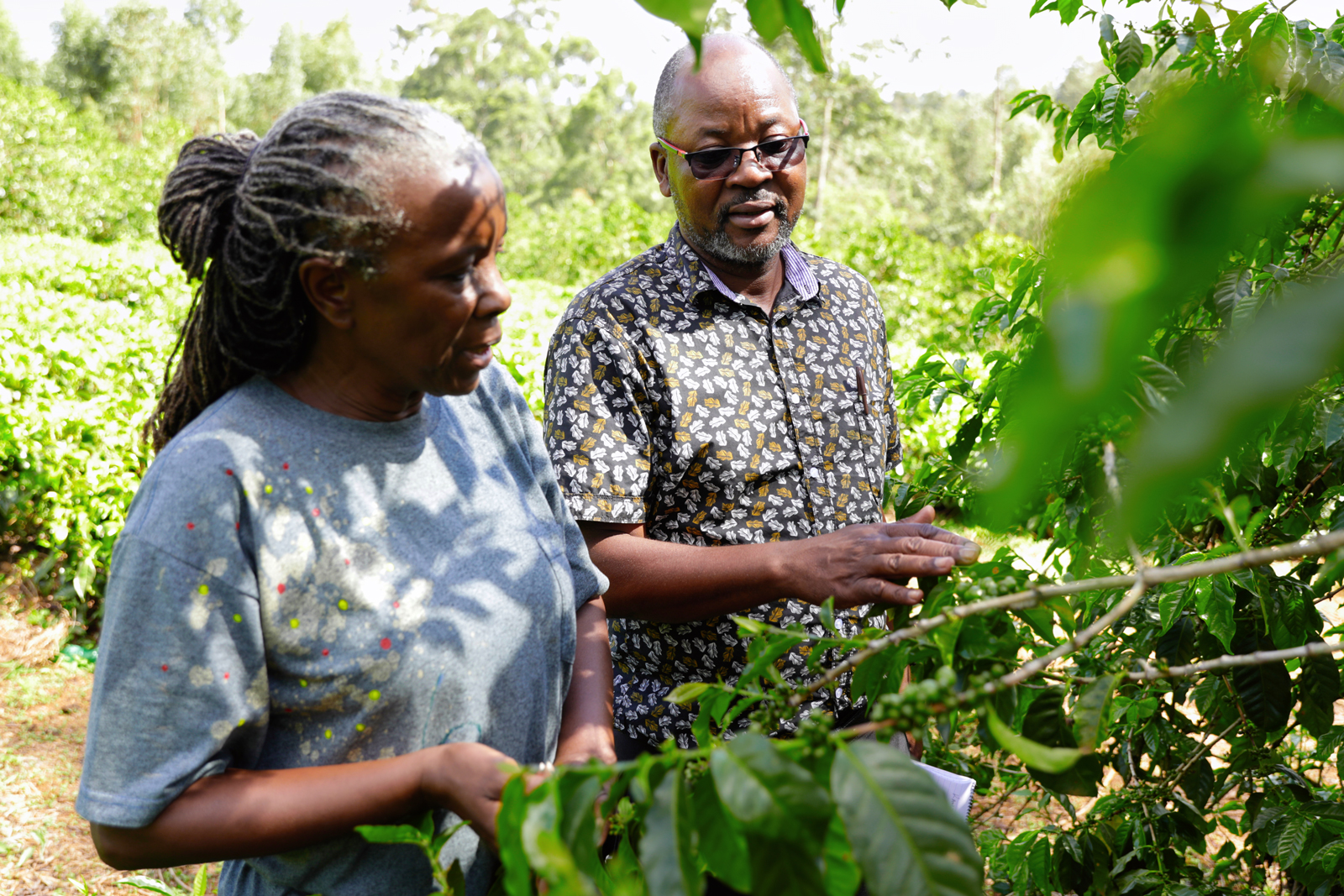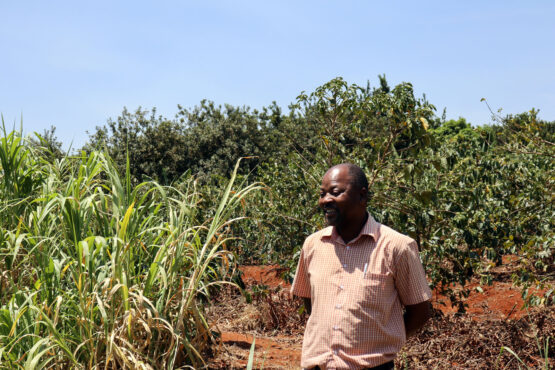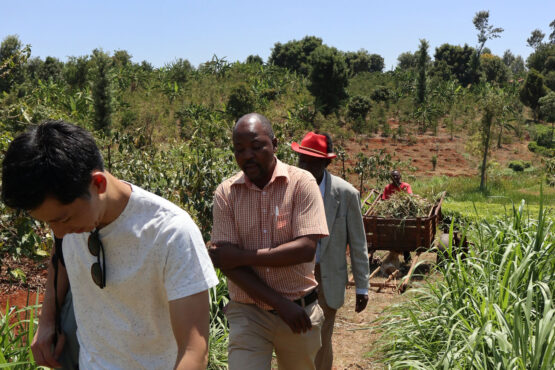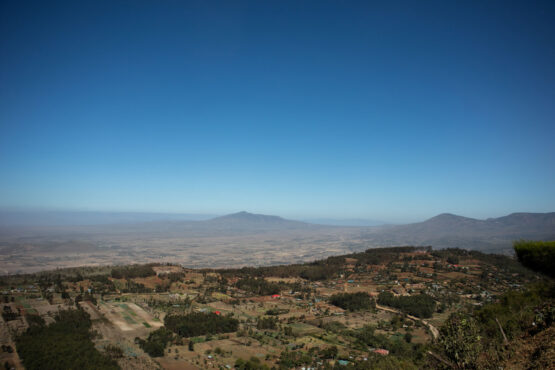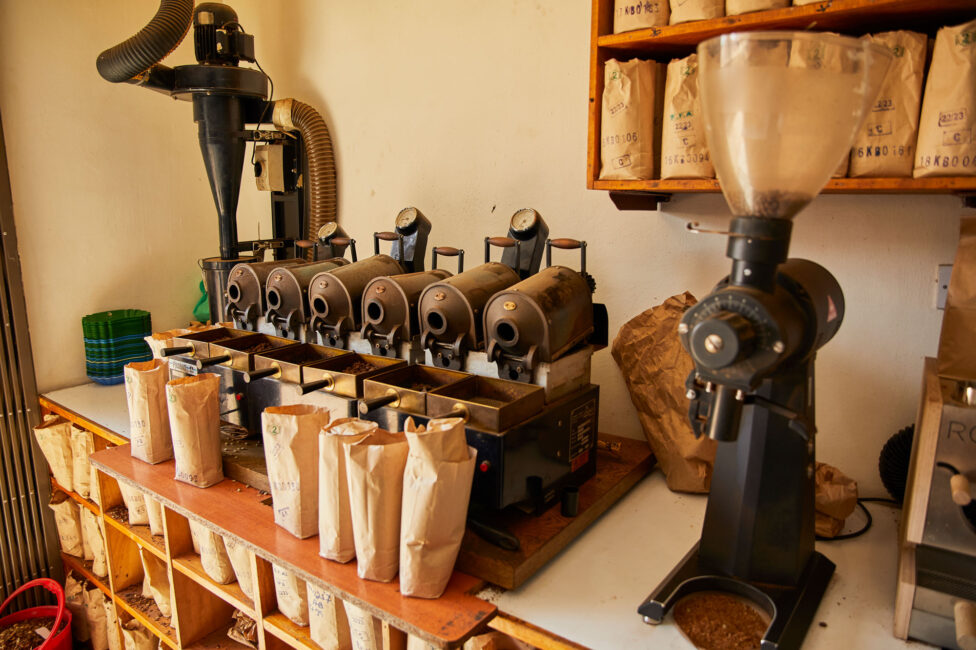Meet Wycliffe
Published May 1 2024
Wycliffe Murwayi understands what it takes to produce exceptional coffee. With over 35 years experience, he has accrued a deep knowlege and understanding of the Kenyan coffee industry, and plays a pivotal role supporting many small producers to establish healthy and resilient farms and elevate coffee quality across the sector. He is a long term friend of MCM and, today, connects us to some of the most quality-focused and forward thinking smallholder farmers and cooperatives across Kenya.
We love spending time with Wycliffe when we are in Kenya, and witnessing his warmth and generosity with the many small producers who rely on his advice and direction. He shares his knowledge expansively — both with the growers and with our team — and is dedicated to elevating farming and processing practices to improve yields and quality. Wycliffe has recently established an independent business, Agriwyse, that focuses on building a market for smallholder farmers by connecting them to international buyers like MCM. We sat down with him to learn more about his journey in coffee and to hear his thoughts on the present and future of the Kenyan coffee industry.
Melbourne Coffee Merchants: How long have you been working in coffee?
Wycliffe Murwayi: I have been working in coffee since 1989, so that makes it nearly 35 years.
MCM: How did your career in coffee begin?
WM: I grew up in Western Kenya, which has no coffee at all. I came to Central Kenya, a region surrounded by large coffee plantations, to study horticulture (agriculture with a focus on fruits, vegetables and flowers) at university. Upon graduation, I thought to myself, “it should be easy to find a job in one of these plantations,” and so I did. At the job interview, I was asked why I wanted to work in a different sector than the one I had studied, but I convinced the panel that coffee was horticulture because it is a fruit. I was employed in 1989 as a trainee farm manager. I adapted quickly, becoming a full farm manager and eventually supervising 5 farms. Over the next 3 decades, I went on to be the general manager in three different companies, before retiring from Sucafina in 2022. am now in private practice working as an agent, connecting small producers and cooperatives with buyers like MCM.
MCM: Could you explain what a marketing agent does?
WM: A farmer needs an agent to sell their coffee. Before the new regulations, a marketing agent would normally perform this role for both auction and direct sales. In the new regulations, a farmer needs a broker to sell at auction and marketing agent for direct sales. So currently a farmer needs both.
A marketing agent is mandated to act for both the farmer and the buyer. After a direct sale, the agent then takes charge of the coffee at the warehouse and does all the logistics for shipment. The agent also performs any instructions or requests from the buyer — like consolidating lots, repacking, sorting, repackaging and documentation. The agent does not take possession of the goods at all.
MCM: Can you describe your role in the Kenyan coffee industry?
WM: I have worked throughout the whole coffee value chain up to the milled green coffee stage. My main area has been the interaction between the farmer and the market. My philosophy is that the farmer can have a greater influence on their final earnings through farming rather than through marketing. So my task has been to demonstrate and convince them to work on production and quality, and then they’ll see the better prices come in. I have worked with the four largest export companies in Kenya as manager of their farm gate operations. Over time this role expanded to include agronomy, supply of farm inputs, crop finance, farmer training and certification, drying mill operations, and marketing.
I have also witnessed a real evolution of the industry over the last three decades, from a fully government-controlled sector to a largely privately led one: from a single dry mill to over 30 mills, from large plantations and giant cooperatives to small estates that produce microlots. During this time, I have also seen the country’s annual production decline by 50% to the current 40,000 metric tons a year.
MCM: Could you tell us why production has declined so much?
WM: There are two main reasons for decline of production in Kenya: declining acreage and lower productivity. Many of the large coffee plantations were very close to the capital city. In the last 20 years, the city has expanded dramatically, with it astronomical rise in land value and demand for housing. Because of that, more than half of Kenya’s large estates have been turned into housing developments. On the other hand, the rural areas have seen a decline in productivity from about 5kg cherry per tree to currently 3 kg. No particular reason is attributed to this, but I think it is because of the breakdown in the cooperative management systems and maybe the change of ownership as the older generation pass the farms to their children. Customarily, the male shilgren inherits and shares the family land. This has therefore resulted in much smaller holdings than what the parents had, losing the economies of scale. It is now common to find a farmer with a total of just 200 to 300 trees. When asked the reason, many farmers say coffee is not as profitable as it was in the 1970s when production was rising.
On the plus side, coffee planting has picked up in the western part of the country which has slowed down the decline. Perhaps we have reached an equilibrium, where the new planting area are equivalent to the uprooting happening in Central Kenya.
MCM: Over your career, how have you seen climate change affect the Kenyan coffee sector?
WM: Kenya, like the rest of the world, has experienced the negative impacts of climate change. Most of Kenya’s coffee is non irrigated since it is grown by small scale farmers in high altitude. The greatest impact brought on by climate change has been changes to rainfall and temperature. My personal experience over my time in coffee, is that there has been a reduction in the average rainfall recorded annually and a rise in temperatures. The predictability of the seasons has also reduced. This results in crop losses when there is either excess or little rain affecting the yield and quality of the produce. A few marginal areas that once grew coffee have also since stopped and replaced it with other crops that require less rainfall. It has been suggested that the top quality of Kenyan coffee has reduced, and one of the possible explanations is the growing conditions changing due to climate change.
MCM: What do you love about working in coffee?
WM: First, coffee is fascinating. I have twice tried to leave the industry but quickly retraced my steps. It is perennial, so most of the work is medium term, with a scope of three to ten years. The results are very visible, the impact is wide and the farmers appreciative. I have worked with some farmers over my entire career and I’m now interacting with the next generation – the heirs. It feels nice to see plans laid out decades ago becoming fruitful.
MCM: Why are you so passionate about working with small holder Kenyan producers?
WM: Small holder Kenyan producers work so hard and are really passionate about their coffee. They are ever so willing to learn and try new things. Every time you have a meeting, even to plan marketing issues, they call it training and call me their teacher. A typical Kenya small farmer is the manager, accountant, worker, agronomist and everything in between for their farm. They almost always purchase something for their coffee farm whenever they go shopping: either pesticide, fertilizer, foliar feed or equipment.
What’s most amazing is that once they trust and believe in you, then they will implement anything and everything you recommend. I have travelled 100 kilometres on days to go and witness a flowering, or unresponsive trees, or pest outbreak or just to sit and talk about their coffee. It has given me great pleasure, as among them I have found great friendships that have transcended to their children.
MCM: Can you tell us a little bit about the recent changes to Kenyan coffee trade model?
WM: Coffee has had frequent price cycles and there have somehow been more bursts than booms. This has led to agitation amongst farmers for the government to intervene. One of the most contentious areas has been the multiple roles played by multinational coffee trade houses in the local operations. The Kenyan government passed new laws in 2024 to limit the number of roles an entity can perform in the chain. For example, an exporter is no longer allowed to be a miller.
The current model is no different from the previous one, except in the distribution of roles. The cooperatives have rushed to establish milling operations, which is currently taking shape. Unfortunately, these are regional in nature, which means capacity may be adequate, but poorly distributed. The current model has the producer processing cherry to parchment, then delivering to a dry mill affiliated with them, who then deliver the parchment to a broker (also working for the producer) who takes the coffee to auction. After the auction, the clearing house pays the producer after deducting any expenses incurred along the chain. This model unfortunately leaves out the plantations and small estates sectors, because they are not organized or large enough to own dry mills and brokerages. It also favours the auction route over private, direct sales.
MCM: What are the challenges and opportunities that Kenyan farmers are currently facing within the new model?
WM: The first challenge is a lack of quality milling capacity while the newly built mills try to establish themselves. The second is the disruption of long established relationships. Some farmers had relations with buyers that have been disrupted. The third challenge is that the system is political, and some competent players may be denied licenses to operate.
The opportunity is that producers can actually forge new relationships and invest in dry milling and export. There is opportunity for direct trade between growers and buyers that are looking for relationships because the new rules encourage farmers to get more involved in the value chain.
MCM: What is the future for Kenyan coffee production?
WM: Coffee production in Kenya has a future, albeit with major changes on the way. If current government reforms do not improve the situation, there may be a wave of exits from farmers in central Kenya that switch to other value chains. However, other regions of the country have embraced coffee farming, and may adequately replace the existing, traditional coffee areas. Therefore, acreage and volumes produced may remain around current levels for the foreseeable future (even though it is debatable if these new areas will match the quality of the central region). It is also foreseeable that there will be more estate-based production than cooperative-based because cooperatives face the challenge of management capacity.
MCM: What would you say to Australian consumers who will enjoy the coffee from the Kenyan farmers you connect us to?
WM: As you enjoy the cup of coffee, you partner with the farmer who produces the coffee. They work had to produce a unique cup just for you and your feedback will assist that farmer to produce an even better cup next year. Kenyan farmers are among the most quality-conscious in the world ,and follow strict growing and processing protocols to deliver the product year in year out. Enjoy this year’s harvest and prepare yourself for even better one next year!
